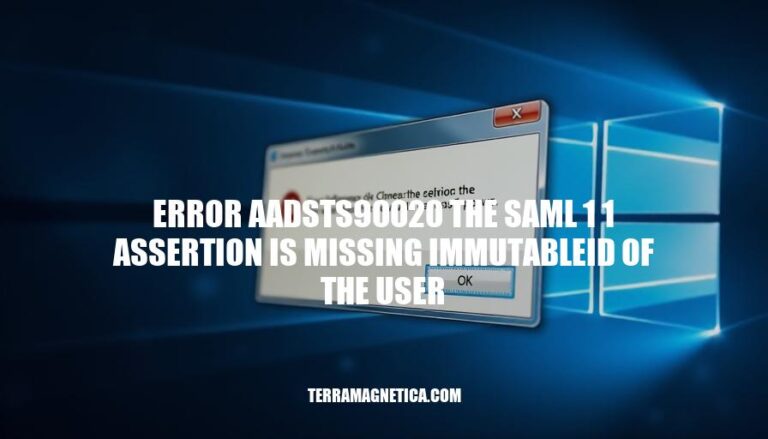


The error AADSTS90020: The SAML 1.1 Assertion is missing ImmutableID of the user occurs during SAML authentication when the assertion lacks the ImmutableID attribute. This attribute is crucial for uniquely identifying users across different systems. Without it, the authentication process fails, preventing users from accessing the intended services. This issue often arises in federated environments, such as when using Active Directory Federation Services (ADFS) with Azure AD.
The error “AADSTS90020: The SAML 1.1 assertion is missing ImmutableID of the user” occurs due to the following specific reasons:
Missing ImmutableID Attribute: The SAML 1.1 assertion does not include the ImmutableID attribute, which is essential for Azure AD to uniquely identify the user. This attribute is typically mapped from the objectGUID in Active Directory.
Incorrect Claim Rules: The claim rules in Active Directory Federation Services (ADFS) might not be configured correctly to issue the ImmutableID attribute. Proper claim rules need to be set up to transform and include the ImmutableID in the SAML assertion.
Third-Party Identity Providers: When using third-party identity providers (IdPs) like Shibboleth, the configuration might not correctly map the ImmutableID attribute. This requires specific claim rules to ensure the ImmutableID is included in the assertion.
Relying Party Trust Configuration: The relying party trust settings in ADFS might not be configured to include the ImmutableID attribute in the SAML assertion. This involves editing the claim issuance policy to ensure the ImmutableID is issued correctly.
These issues need to be addressed by configuring the appropriate claim rules and ensuring the ImmutableID attribute is included in the SAML 1.1 assertion.
To identify the error AADSTS90020: The SAML 1.1 Assertion is missing ImmutableID of the user in authentication logs and error messages, follow these steps:
Check Authentication Logs:
Common Scenarios:
Error Messages:
: Learn more
: Learn more
: Learn more
Sure, here are the step-by-step instructions to resolve the error ‘AADSTS90020: The SAML 1.1 assertion is missing ImmutableID of the user’ by configuring claim rules in ADFS:
Open ADFS Management Console:
Add Claim Rule:
Add Issuance Transform Rule:
Configure Custom Rule:
c:[Type == "http://schemas.xmlsoap.org/claims/UPN", Issuer == "AD AUTHORITY"]
=> issue(store = "Active Directory", types = ("http://schemas.microsoft.com/LiveID/Federation/2008/05/ImmutableID"), query = ";objectGUID;{0}", param = c.Value);
Finish and Apply:
Test the Configuration:
These steps should help resolve the error by ensuring the ImmutableID is correctly included in the SAML assertion.
To prevent the error ‘AADSTS90020: the SAML 1.1 assertion is missing ImmutableID of the user’ from occurring in the future, follow these best practices:
Regular Audits of Claim Rules:
Proper Configuration of Identity Providers:
Consistent Attribute Mapping:
Monitoring and Logging:
User Synchronization:
Documentation and Training:
Implementing these practices can help maintain a smooth and error-free authentication process.
The error ‘AADSTS90020: The SAML 1.1 assertion is missing ImmutableID of the user’ occurs due to missing or incorrect configuration of claim rules, identity providers, and attribute mapping in SAML authentication processes.
To resolve this issue, it’s essential to properly configure custom rules for issuing claims, ensure consistent attribute mapping between identity providers and relying parties, and maintain robust monitoring and logging to quickly identify and troubleshoot issues related to missing claims.
Regular audits of claim rules, proper configuration of identity providers, user synchronization, and documentation and training are also crucial in preventing this error from occurring in the future.